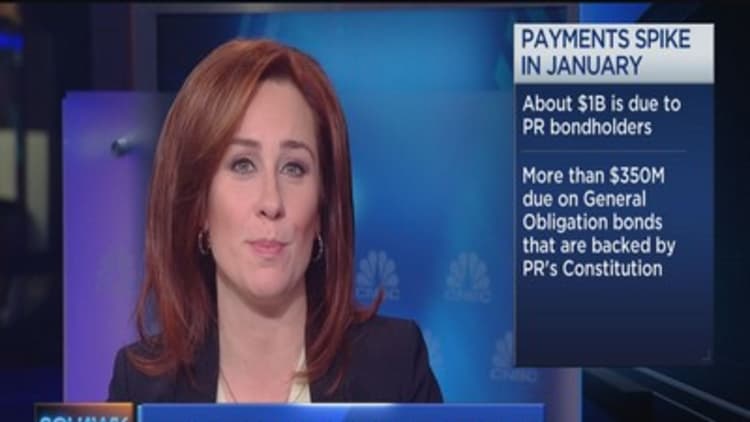
Facing a major debt deadline, Puerto Rico on Tuesday scrambled to free up $355 million to stave off a default. In addition, the governor announced an unprecedented plan that would take money from one group of bondholders to pay another.
"Starting today, the commonwealth of Puerto Rico will have to claw back revenues pledged to certain bonds issued in order to maintain essential public services," Gov. Alejandro Garcia Padilla said at a Senate Judiciary Committee hearing. "We have taken this difficult step in the hope that Congress will act soon."
The clawback refers to using revenues supporting certain commonwealth tax-supported bonds issued by the U.S. territory, to pay for debt backed by Puerto Rico's Constitution. Examples of Puerto Rico tax-supported bonds include: the Puerto Rico Sales Tax Financing Corp. (COFINA), the Highway and Transportation Authority (HTA) and the infrastructure authority (PRIFA).
However, COFINA bonds have strong legal protections and according to bond documents, the sales tax revenue collected to pay holders of its debt, is not subject to clawbacks.
A large portion of the payment due Tuesday to bondholders of the Government Development Bank is general obligation-guaranteed, meaning it carries that constitutional payment priority. Also falling under that category is about $330 million due Jan. 1 on general obligation bonds, which are backed by the full faith, credit and taxing power of Puerto Rico.
The general obligation payment is part of the approximately $1 billion in obligations due on Jan. 1, which the liquidity-strapped island does not have the money to pay.
Clawbacks have been a concern among bondholders, as well as the major insurers of Puerto Rico's paper, including Assured Guaranty's CEO Dominic Frederico, as detailed by BTIG analyst Mark Palmer.
"Frederico said that the Puerto Rico issuing entity on which he is most focused is the Highway and Transportation Authority in large part because of the general obligation bonds' potential clawback of the revenues supporting that debt," Palmer said in a recent note.
Read MoreUS plan for Puerto Rico isn't good enough
"While the Puerto Rico government would not be able to claw back revenue from tolls, its ability to do so from other revenues had made management concerned."
The legality of clawbacks was also a concern of Nader Tavakoli, CEO of Ambac, a guarantor of Puerto Rico-issued debt.
"Among other things, to claw back certain revenues the commonwealth must show that it has a revenue shortfall and cannot pay for all appropriations and there are no other resources available to make the general obligation debt payment," Tavakoli said on the company's third quarter earnings call. "A clawback of revenue is permitted only if all available resources are utilized and only for the purpose of making payments on public debt."
Read MorePuerto Rico is edging closer to bankruptcy
During Tuesday's hearing in Washington, the governor also reiterated the dire state of Puerto Rico's growing liquidity crisis and asked Congress for access to a legal framework to restructuring its $70 billion debt load. Unlike U.S. cities and states, Puerto Rico does not have access to debt restructuring under Chapter 9 of the federal bankruptcy code.
Following testimony by Garcia Padilla and the commonwealth's resident commissioner, Pedro Pierluisi, the Government Development Bank issued a statement confirming that all payments due Tuesday had been made.
"Today's debt service payments reflect our commitment to honor our obligations notwithstanding the extreme fiscal challenges we face in an effort to facilitate a voluntary restructuring process with our creditors," said Development Bank President Melba Acosta Febo. "However, make no mistake, Puerto Rico's liquidity position is severely constrained at this time despite the extraordinary measures the government has taken to improve it."
Read MoreForget bankruptcy, this is how to fix Puerto Rico
In his opening remarks, Sen. Richard Blumenthal, D-Conn., said Puerto Rico was only able to narrowly avoid defaulting on its debt payment on Tuesday "by resulting to unsustainable financial gymnastics."
In his written testimony, Garcia Padilla insisted that he was trying to come up with a solution that will satisfy all parties, but his main focus was on the well-being of the island's 3.5 million residents.
"In simple terms, we have begun to default on our debt in an effort to attempt to repay bonds issued with the full faith and credit of the commonwealth and secure sufficient resources to protect the life, health, safety and welfare of the people of Puerto Rico," he said.
Updated: This story was updated to note the additional legal protections the Puerto Rico Sales Tax Financing Corp. (COFINA) bonds have.

